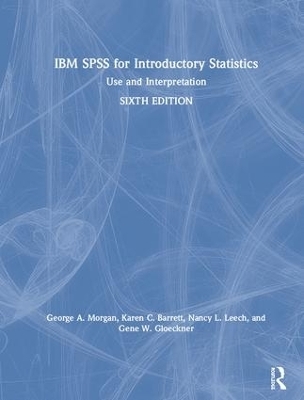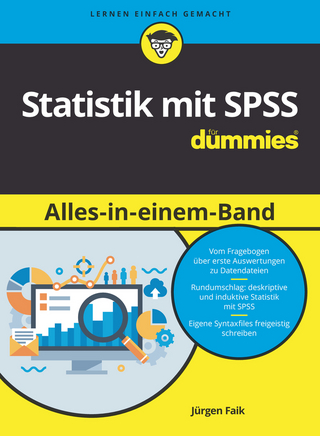
IBM SPSS for Introductory Statistics
Routledge (Verlag)
978-1-138-57822-7 (ISBN)
IBM SPSS for Introductory Statistics is designed to help students learn how to analyze and interpret research. In easy-to-understand language, the authors show readers how to choose the appropriate statistic based on the design, and to interpret outputs appropriately. There is such a wide variety of options and statistics in SPSS, that knowing which ones to use and how to interpret the outputs can be difficult. This book assists students with these challenges.
Comprehensive and user-friendly, the book prepares readers for each step in the research process: design, entering and checking data, testing assumptions, assessing reliability and validity, computing descriptive and inferential parametric and nonparametric statistics, and writing about results. Dialog windows and SPSS syntax, along with the output, are provided. Several realistic data sets, available online, are used to solve the chapter problems. This new edition includes updated screenshots and instructions for IBM SPSS 25, as well as updated pedagogy, such as callout boxes for each chapter indicating crucial elements of APA style and referencing outputs.
IBM SPSS for Introductory Statistics is an invaluable supplemental (or lab text) book for students. In addition, this book and its companion, IBM SPSS for Intermediate Statistics, are useful as guides/reminders to faculty and professionals regarding the specific steps to take to use SPSS and/or how to use and interpret parts of SPSS with which they are unfamiliar.
George A. Morgan is Emeritus Professor of Education and Human Development at Colorado State University. He received his Ph.D. in child development and psychology from Cornell University. In addition to writing textbooks, he has advised many Ph.D. students in education and related fields. He has conducted a program of research on children’s motivation to master challenging tasks. Karen C. Barrett is Professor of Human Development and Family Studies at Colorado State University, where she teaches research methods and statistics classes as well as classes in her research area. She is also Professor of Community & Behavioral Health at Colorado School of Public Health. She received her Ph.D. in developmental psychology from the University of Denver. Her research takes a functional approach to studying emotional and motivational processes and their influence on development; family and cultural influences on emotion regulation; and the development of social emotions such as guilt and shame. Nancy L. Leech is Professor of Research and Evaluation Methods at the University of Colorado, Denver. She teaches graduate level courses in research, statistics, and measurement. She received her Ph.D. in education with an emphasis on research and statistics from Colorado State University in 2002. Her area of research is promoting new developments and better understandings in applied, quantitative, qualitative, and mixed methods research. Gene W. Gloeckner is Professor, former IRB Chair, former School of Education Director, and one voyage Semester at Sea Dean. He received his Ph.D. and B.S. from The Ohio State University and M.S. from Colorado State University. Much of his writing and teaching has focused on issues in quantitative and mixed research methods. He has served as the academic advisor for over 60 doctoral graduates.
Preface
Chapter 1 - Variables, Research Problems, and Questions
Chapter 2 - Data Coding, Entry, and Transformation
Chapter 3 - Measurement and Descriptive Statistics
Chapter 4 - Understanding Your Data and Checking Assumptions
Chapter 5 - Selecting and Interpreting Inferential Statistics
Chapter 6 – Methods to Provide Evidence for Reliability and Validity
Chapter 7 - Cross-Tabulation, Chi-Square, and Nonparametric Measures of Association
Chapter 8 - Correlation and Regression
Chapter 9 - Comparing Groups with t Tests, Analysis of Variance (ANOVA), and Similar Nonparametric Tests
Appendices
For Further Reading
Index
| Erscheinungsdatum | 17.07.2019 |
|---|---|
| Verlagsort | London |
| Sprache | englisch |
| Maße | 210 x 280 mm |
| Gewicht | 650 g |
| Themenwelt | Geisteswissenschaften ► Psychologie |
| Mathematik / Informatik ► Mathematik ► Computerprogramme / Computeralgebra | |
| Mathematik / Informatik ► Mathematik ► Statistik | |
| Sozialwissenschaften ► Pädagogik ► Erwachsenenbildung | |
| ISBN-10 | 1-138-57822-3 / 1138578223 |
| ISBN-13 | 978-1-138-57822-7 / 9781138578227 |
| Zustand | Neuware |
| Informationen gemäß Produktsicherheitsverordnung (GPSR) | |
| Haben Sie eine Frage zum Produkt? |
aus dem Bereich


